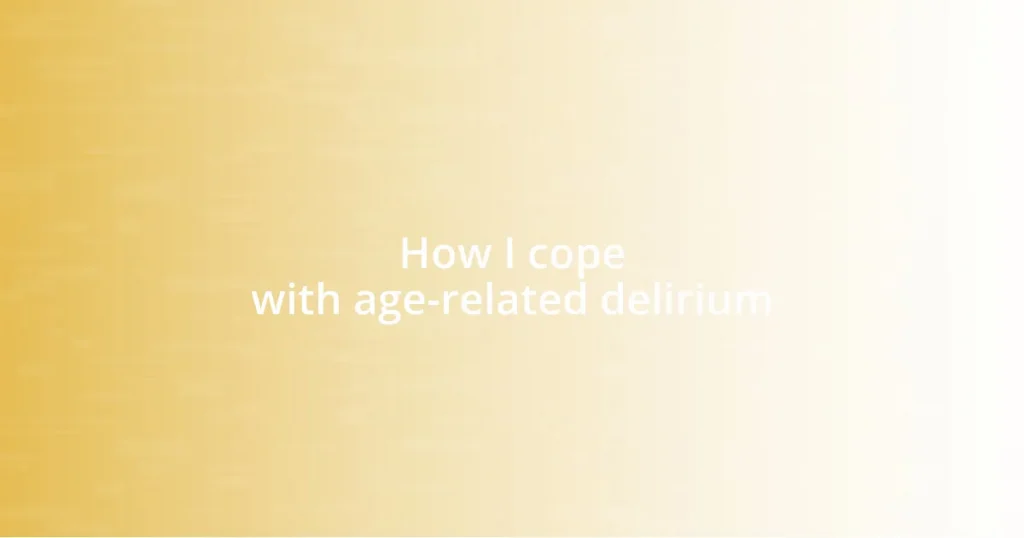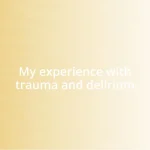Key takeaways:
- Age-related delirium is characterized by sudden changes in attention and cognition and can be reversible with prompt intervention.
- Recognizing symptoms early, such as confusion and mood swings, is crucial for timely care and intervention.
- Creating a calm, familiar environment and maintaining routines can help manage delirium effectively.
- Seeking professional help from healthcare providers and mental health professionals is essential for proper diagnosis and support.

Understanding age-related delirium
Age-related delirium can be a bewildering experience, both for those facing it and their loved ones. I remember the time I visited my grandmother at the hospital, when her confusion became apparent. One moment she was reminiscing about her childhood, and the next, she was convinced that the nurse was an old friend. It left me wondering, how can someone shift so quickly between reality and hallucinations?
Delirium manifests in different ways, often characterized by sudden changes in attention, awareness, and cognition. I’ve seen it not just disrupt daily life but also fracture the sense of identity for some elderly individuals. Imagine feeling lost in your own mind; it’s a profoundly unsettling experience, and it raises the question: how do we navigate these moments with compassion and understanding?
What’s particularly striking about age-related delirium is its often reversible nature when addressed promptly. When my friend’s father went through this at the age of 85, we were all on high alert. It became a team effort among family members and healthcare providers to pinpoint the triggers—medications, dehydration, or infection. Ultimately, I learned that confronting and understanding delirium isn’t just about managing symptoms; it’s about connecting with the person behind the confusion.

Recognizing symptoms of delirium
Recognizing the symptoms of delirium can initially seem daunting due to the subtle nature of its onset. I recall a time when a family member exhibited signs that looked like simple forgetfulness at first. It wasn’t until he couldn’t recognize familiar faces that alarm bells truly rang for us. This sudden shift in demeanor highlighted the urgency in identifying the symptoms early on, as it can often signal underlying health issues.
There are specific symptoms to look out for, including confusion, difficulty concentrating, and even changes in sleep patterns. I’ve come to realize that recognizing these signs is crucial for timely intervention. For instance, during a visit to an elderly neighbor, her sudden inability to recall how we met—paired with rapid mood swings—illustrated how delirium can manifest unexpectedly. Acknowledging these behaviors can make all the difference in ensuring that an individual receives the proper care they need.
To assist in identifying these symptoms, I find it helpful to view them in a comparative context. The table below outlines key symptoms of delirium alongside other conditions that may seem similar. By understanding these differences, I believe caregivers can become more adept at recognizing when a loved one may be experiencing delirium.
| Symptom | Delirium | Dementia |
|---|---|---|
| Onset | Sudden changes | Gradual decline |
| Attention | Inability to focus or sustain attention | Generally intact in early stages |
| Awareness | Fluctuating level of awareness | Consistent awareness deficits |
| Duration | Hours to days | Months to years |
| Reversibility | Often reversible with treatment | Progressive and irreversible |

Strategies for managing delirium
Managing age-related delirium requires a thoughtful and proactive approach. I’ve found that creating a calm and familiar environment can significantly help those experiencing delirium. For instance, when my aunt was in a state of confusion, we set up her room with her favorite photos and comforting objects. This small act made her feel more grounded and connected to reality. Alongside environmental adjustments, engaging loved ones in meaningful conversations can help redirect their attention and alleviate feelings of disorientation.
Here are some effective strategies I’ve observed:
- Maintain a consistent routine: Regular schedules for meals, medications, and sleep can reduce confusion.
- Encourage hydration and nutrition: Assessing dietary needs and ensuring adequate fluid intake can combat factors that contribute to delirium.
- Limit stimuli: Reducing noise and distractions can help those suffering from delirium feel more secure.
- Involve familiar faces: The presence of family or friends can provide comfort and a sense of safety in times of distress.
It’s essential to approach managing delirium with patience and understanding. I recall the time my neighbor was admitted to the hospital. Initially, he was disoriented and frightened. By having his daughter stay by his side, narrating stories of their life together, I witnessed a profound calming effect on him. It made me realize that sometimes, emotional connections can break through the fog of delirium, offering moments of clarity that feel like anchors in the storm of confusion.

Importance of a supportive environment
Creating a supportive environment is crucial for anyone grappling with age-related delirium. From my experience, open communication and a calm atmosphere can work wonders. I remember a time when my grandmother faced sudden confusion during a family gathering. By simply reframing the space into a quieter room and allowing her to share her thoughts without interruption, we created a bubble of comfort. It’s interesting how sometimes, just a little adjustment can open the door to understanding.
The role of familiarity cannot be overstated. I recall how my father would often struggle with unfamiliar settings during his bouts of delirium. I learned that surrounding him with cherished mementos and keeping beloved family members nearby not only eased his anxiety but also sparked memories that brought him joy. Does the presence of a loved one remind you of better times? It’s as if their mere existence provided a lifeline, anchoring him back to reality.
Moreover, having a routine can vastly improve how someone experiences delirium. When my neighbor was unwell, we established a simple daily schedule that included short, regular interactions. Little by little, I noticed how these small, predictable moments helped her find stability amidst the chaos. This, I believe, reinforces the idea that a nurturing environment is not just a backdrop—it’s an essential component in navigating the stormy seas of delirium.

Seeking professional help
Seeking professional help is a critical step in addressing age-related delirium. I remember when my uncle was struggling, and his doctor’s guidance was invaluable. Not only did his physician provide a clear diagnosis, but they also offered a tailored treatment plan that included medication adjustments and cognitive therapy. This combination truly made a difference and highlighted the importance of seeking expertise.
It’s easy to feel overwhelmed when a loved one is experiencing delirium. I’m reminded of how I felt when my neighbor was suddenly confused and disoriented—standing in the emergency room, I realized that professional support was necessary. Nurses and doctors played a vital role in calming him down and ensuring he received adequate care. They constantly checked his vitals and reassured both him and our family. This experience taught me that professionals have specialized training and tools that can make a significant impact in these delicate situations.
Engaging with mental health professionals is just as important. When my friend’s grandmother experienced longer episodes of confusion, consultation with a geriatric psychologist allowed us to understand the behavioral side of delirium. The insights we gained helped our family provide better emotional support. It makes me wonder, how could we manage without their expertise? Their perspectives not only clarified our concerns but also equipped us with effective strategies to support her better as a family unit.

Long-term coping mechanisms
In my journey with age-related delirium, I’ve discovered that cultivating mindfulness can be a game-changer. A dear friend once introduced me to guided meditations, and I was astonished to see how a few moments of focused breathing could center both the individual experiencing delirium and those supporting them. Have you ever noticed how a calm presence can be contagious? I certainly have, as I witnessed how my friend was able to regain a sense of control, even when confusion loomed. This technique became a cornerstone in our long-term strategy—fostering mental clarity in a chaotic world.
Establishing trust plays a significant role in long-term coping. After observing my grandmother struggle, I started to implement gentle reassurance as a daily practice. I remember reading her old letters, and sharing those stories seemed to wrap her in a warm blanket of recognition. There’s something beautifully powerful about shared memories that transcends the fog of delirium. Is there a story that resonates with your loved ones? I found that tapping into these narratives creates a bridge to familiarity and comfort, allowing for a more supportive emotional landscape.
Another vital mechanism I’ve employed is fostering social connections. In moments of bewilderment, I noticed how the presence of friends or familiar neighbors ignited sparks of recognition in my father. Organizing small gatherings by inviting his closest friends would bring joy and laughter, illuminating fleeting moments of clarity. Has this ever happened for you or a loved one? Those small pockets of joy not only bolstered morale but also became a cherished lifeline, making it clear to me that building a community around our loved ones can significantly ease the turmoil of delirium in the long run.















